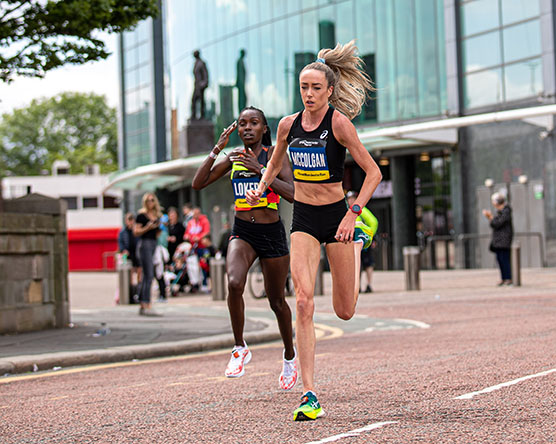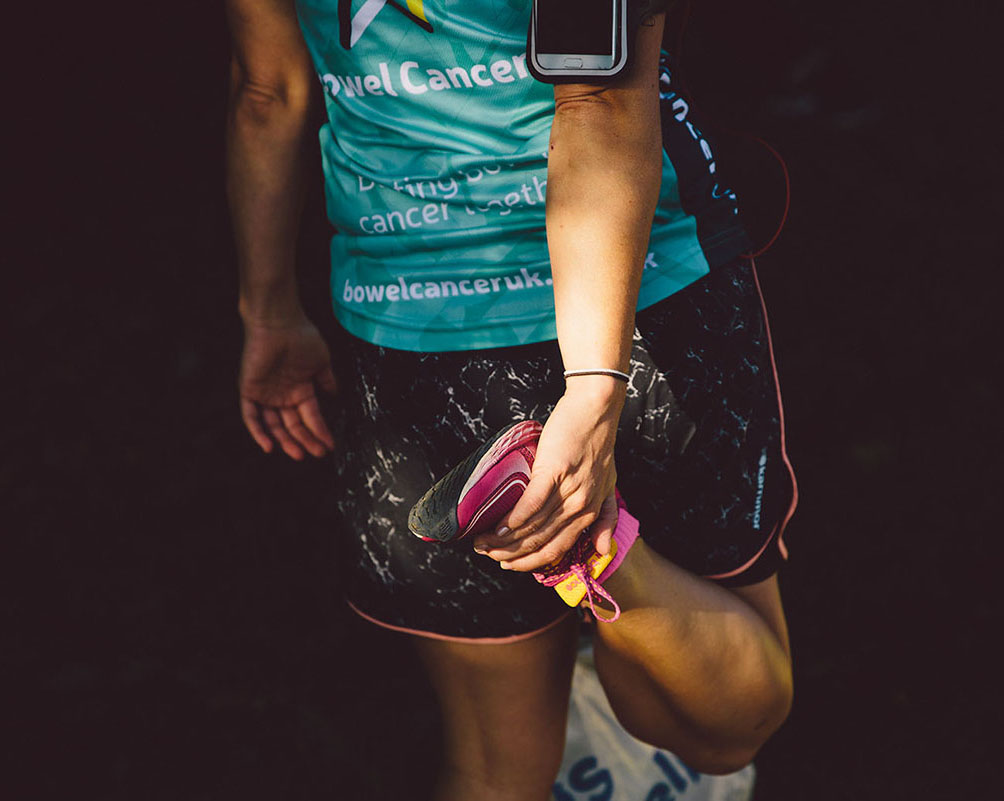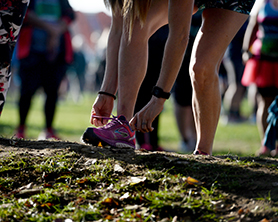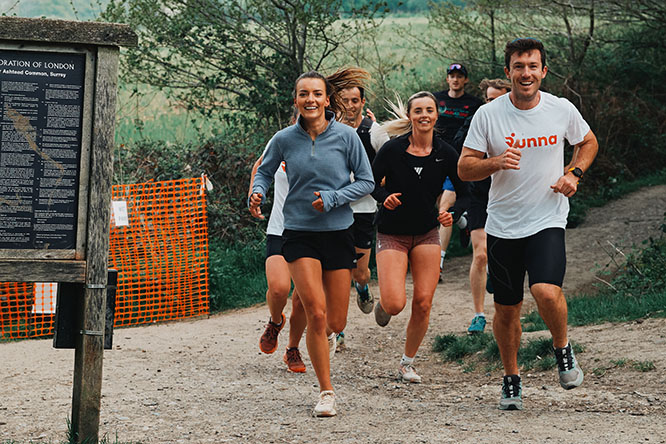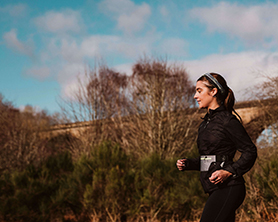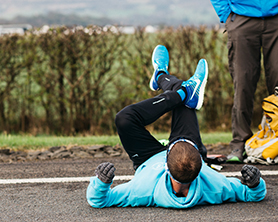We all know about eating the right food to fuel your run – but what about eating the right food to recover from it?
Believe it or not, eating for post-run recovery is *more* important than eating to fuel it beforehand. It builds strength and stamina, helps make your running routine more consistent and helps guards against injuries.
If this is news to you, never fear – read on for our top recovery nutrition tips and three inspiring recipes to banish food boredom and maximise replenishment and recovery. Let’s go!
Top recovery nutrition tips
Want to keep feeling strong? Then respect the magic window, i.e. the 20-30 minute period immediately after a run. During this time your muscles are super-receptive to nutrients, helping them build back glycogen (energy) stores, repair and regenerate. Fail to do it and, over time, you’ll start to feel heavy, fatigued and grumpy – a less-than-ideal mindset for training!
Carbmania
Your body converts carbohydrates into blood glucose which is used for energy – handy for running! After around 60 minutes of activity, though, these energy stores start to run low. That’s why experts recommend getting some carbohydrates in *after* your run, too – post-run pancakes, anyone?
Don’t forget the protein
However, protein is a really important part of the post-run nutrition picture, too. Every time we run, we put our muscles through trauma – but a decent dose of protein afterwards can help them regenerate and get stronger over time.
It’s all about ratios
The key to recovery, then, is to have a carby snack plus an easy protein kick – say a glass of milk – ready to hit your post-run magic window. Or you could combine carbs and protein with a recipe such as pancakes, rice cakes with cottage cheese or a banana and a handful of almonds – just aim for a carb/protein ratio of 3 or 4:1 for best results.
Rehydration
And don’t forget to rehydrate for recovery, too – for longer, more intense runs where you sweat a lot, you’ll need to replenish lost electrolytes (that’s a mixture of sodium, potassium, magnesium and calcium). Try topping up with a banana recovery shake, chocolate milk, maca tea with honey or a homemade blueberry smoothie made with milk, buttermilk or yoghurt.
Recipes for recovery
Red duck curry with lychees and fragrant jasmine rice
Serves 4
Ingredients:
4 duck legs
Salt
2 tbsp red curry paste (use less if you like it mild)
200ml coconut cream
100ml chicken stock
1 dessert spoon Thai fish sauce
1 dessert spoon sugar
4 kaffir lime leaves (optional)
250g fragrant jasmine rice
16 lychees, peeled and deseeded, or seedless grapes
Small handful basil or coriander leaves, chopped
Method:
- Preheat the oven to 180°C/gas mark 4
- Remove the excess fat and any extra skin hanging off the sides of the duck legs and pat dry. Sprinkle with a little salt and then fry very gently in a wok/frying pan skin side down for about 35 minutes. The skin should be nice and crispy. Spoon off the excess fat every now and then
- Spoon off any excess fat again and turn the legs over. Cook the legs for a further 10–15 minutes and then pop them onto a roasting pan, skin side up, and put them in the oven for 10–15minutes, while you make the sauce and cook the rice.
- Using the same frying pan that you cooked the duck in, fry the red curry paste with a tablespoon or two of coconut cream, stirring all the time for 2 minutes, then add the remaining coconut cream, chicken stock, fish sauce, sugar and the lime leaves.
- Prepare the jasmine rice. Rinse the rice in cold water and then place in a pan with 600ml water (enough to cover the rice by ½ inch, or to the first joint of your middle finger). Cover with a tight fitting lid, bring to the boil and simmer for 7-10 minutes, or until all the water has been absorbed. Turn off the heat and leave for 4-5 minutes. Uncover the pan and fluff up the rice to serve.
- Put the duck legs back in the pan to finish cooking in the sauce, crispy skin side up. Simmer for a few minutes and then add the lychees and the basil or coriander.
- Taste for seasoning. You might need to add a little extra stock or some lime juice if the sauce is too rich and thick.
- Serve with steamed jasmine rice to soak up the juices.
Chicken, lemon and fennel tagine with quinoa
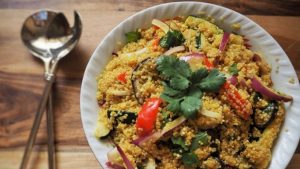
Serves 4
Ingredients:
300g quinoa
1 tbsp plain flour or gluten-free equivalent
½ tsp freshly ground black pepper
½ tsp salt
2 tsp cumin seeds, dry roasted and crushed in a pestle and mortar
2 tsp coriander seeds, dry roasted and crushed in a pestle and mortar
1 tsp ground ginger
8 free range chicken thighs, trimmed of skin and fat
2 tbsp olive oil
1 large red onion, peeled and finely sliced
2 cloves garlic, peeled and roughly chopped
Approx 600g fennel, cut lengthways, (save any green feathery fronds for decoration)
750ml chicken stock (or enough to cover the chicken)
Zest and juice of one large lemon
2 handfuls of pitted olives, green, black or a mix
Large bunch (50g) fresh flat-leaf parsley
Method:
- Mix the flour with the salt, pepper and spices on a large plate. Coat the chicken thighs in the spice mix.
- Heat the olive oil in the tagine dish and gently sauté the onion for about 5 minutes, until soft and translucent. Move the onion to the side of the dish and add the chicken, skin side down. Brown for about five minutes and then turn over to brown on the other side for a couple of minutes.
- Add any leftover spice mix and the garlic. Slot the fennel around the chicken and then pour over the chicken stock. Scatter the lemon zest over the top and add the lemon juice. Cover and simmer gently for about 40 minutes until the chicken is cooked through.
- Uncover and turn up the heat to reduce the sauce a little. Add the olives and warm through. Taste for seasoning and add the parsley.
- Meanwhile, prepare the quinoa according to the instructions on the pack.
- Serve with the tagine in deep warmed bowls, with the fennel fronds scattered over for decoration.
Chilli Chocolate Chicken
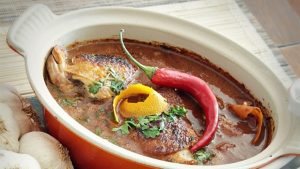
Serves 4
Ingredients:
- 2 dried chillies (or to taste)
- 50g raisins
- 8 free-range bone-in chicken thighs
- Salt and freshly ground black pepper
- 2 tbsp coconut or sunflower oil
- 2 onions, peeled and finely sliced
- 1 cinnamon stick
- 2 tsp each ground coriander and ground cumin
- ¼ tsp ground cloves
- 3 garlic cloves, peeled and crushed
- 1 heaped tbsp peanut, cashew or almond butter
- 1 tsp chilli paste (optional)
- Zest of ½ an orange
- 400g can of chopped tomatoes
- 500ml chicken stock
- 25g dark chocolate (at least 70% cocoa solids)
- Juice of one lime
- 25g fresh coriander, roughly chopped,
- Soured cream and lime wedges to serve
Method:
- Put the chillies and raisins in a small bowl, cover with boiling water and leave for 10 minutes.
- Season the chicken. Heat 1 tbsp oil in a flameproof casserole dish and brown the chicken, turning frequently to seal all over. Remove and set aside. Add another 1 tbsp oil to the casserole and sauté the onions until soft and translucent. Stir in the cinnamon stick, coriander, cumin and cloves and cook for 1 minute. Return the chicken and take off the heat.
- Blend the chillies, raisins and soaking water, or bash with a pestle and mortar. Add this to the casserole with the garlic, nut butter, chilli paste (if using), plus the orange zest and tomatoes. Pour in enough stock to cover everything. Return the casserole to the heat and bring to the boil.
- Cover, reduce to a simmer, and cook for 45 minutes or until the sauce is thick and the chicken is cooked through. Add the chocolate and continue to cook, uncovered, on a low heat for another 15 minutes. If the sauce is too thick, add more stock or water. Stir in the lime juice and check for seasoning.
- Sprinkle with coriander and serve with a dollop of soured cream and lime wedges.
Image credit: Vitalii Pavlyshynets on Unsplash



